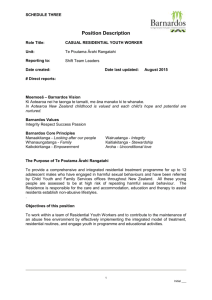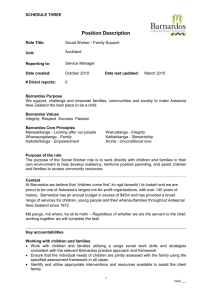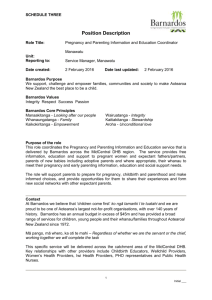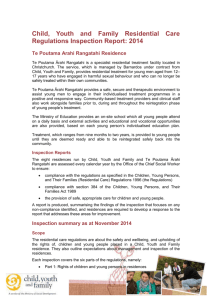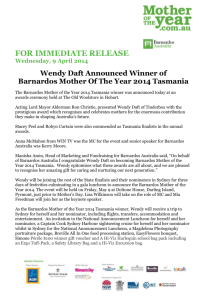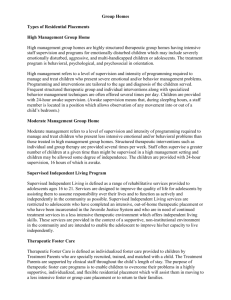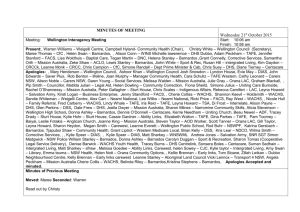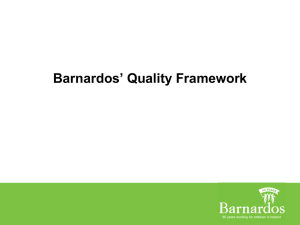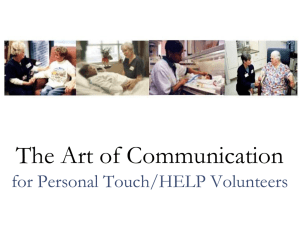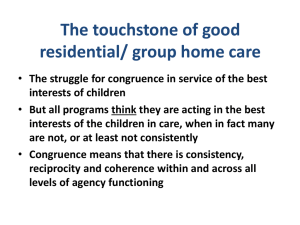TPAR Clinician JD
advertisement
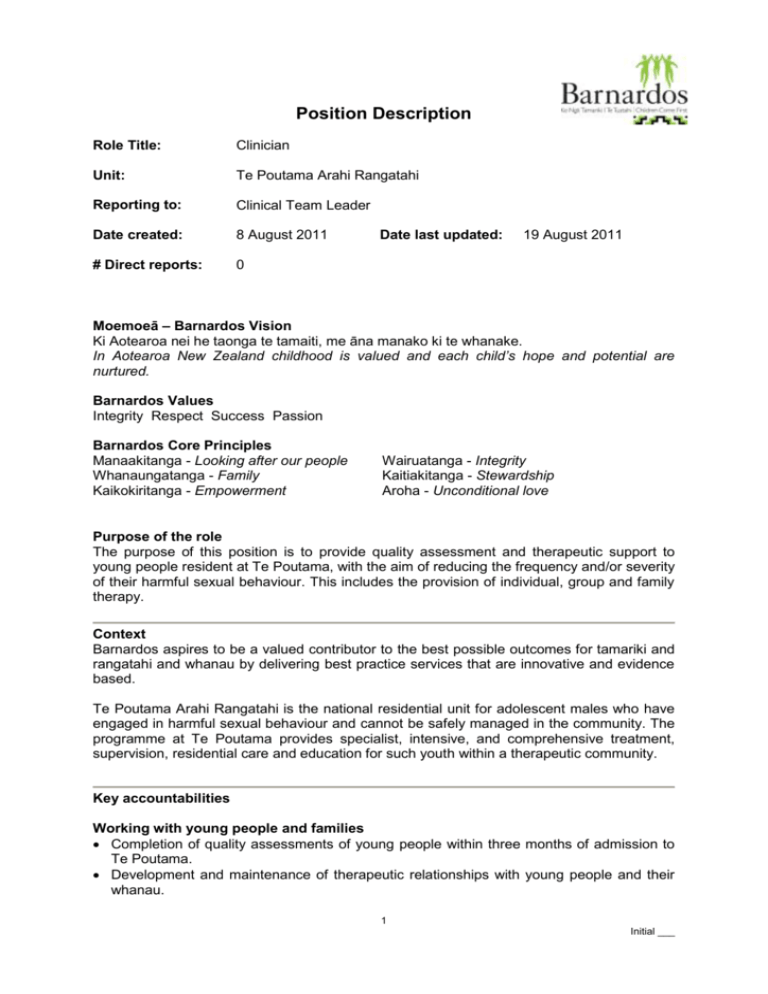
Position Description Role Title: Clinician Unit: Te Poutama Arahi Rangatahi Reporting to: Clinical Team Leader Date created: 8 August 2011 # Direct reports: 0 Date last updated: 19 August 2011 Moemoeā – Barnardos Vision Ki Aotearoa nei he taonga te tamaiti, me āna manako ki te whanake. In Aotearoa New Zealand childhood is valued and each child’s hope and potential are nurtured. Barnardos Values Integrity Respect Success Passion Barnardos Core Principles Manaakitanga - Looking after our people Whanaungatanga - Family Kaikokiritanga - Empowerment Wairuatanga - Integrity Kaitiakitanga - Stewardship Aroha - Unconditional love Purpose of the role The purpose of this position is to provide quality assessment and therapeutic support to young people resident at Te Poutama, with the aim of reducing the frequency and/or severity of their harmful sexual behaviour. This includes the provision of individual, group and family therapy. Context Barnardos aspires to be a valued contributor to the best possible outcomes for tamariki and rangatahi and whanau by delivering best practice services that are innovative and evidence based. Te Poutama Arahi Rangatahi is the national residential unit for adolescent males who have engaged in harmful sexual behaviour and cannot be safely managed in the community. The programme at Te Poutama provides specialist, intensive, and comprehensive treatment, supervision, residential care and education for such youth within a therapeutic community. Key accountabilities Working with young people and families Completion of quality assessments of young people within three months of admission to Te Poutama. Development and maintenance of therapeutic relationships with young people and their whanau. 1 Initial ___ Provision of individual, group and family therapy using a range of therapeutic modalities. Engagement in effective treatment and case planning which reflect the application of programme treatment models and which involve key staff from all areas at Te Poutama. Provision of risk assessments related to self-harm, suicide and absconding which are reviewed regularly. Clinical progress reports are provided as required in a timely fashion. Alongside key residential staff, take responsibility for ensuring that youth have behaviour management plans clearly aligned to their treatment goals and that residential staff have the skills and understanding necessary to implement these plans. Where requested, provides quality clinical supervision to residential youth workers at Te Poutama. Where requested, to deliver training to residential staff relevant to clinicians’ expertise. Relationships Develop and maintain respectful, actively participating client relationships that: o Take into account individual differences and the cultural and social context of the young person’s situation o Validate the young person’s experience, beliefs and values and acknowledge their expertise in their own lives o Maintain appropriate professional boundaries o Reflect Barnardos core principles and values. Develop strong collaborative relationships with community and other agencies and networks, particularly Child, Youth and Family and the community based treatment providers, to ensure young people and families receive coordinated service provision. Maintain good relationships with key staff within the clinical, residential and education teams. Demonstrate appropriate professional conduct at all times to ensure that Barnardos reputation is maintained in the community. Practice Standards Ensure that practice is planned in consultation with the Team Leader and delivered within appropriate time frames. Ensure that practices are consistent with the Children, Young Person’s and their Families Act (1989), Barnardos policies and procedures and other relevant legislation. Participate in professional and team development and up-skilling, including supervision and case reviews. Participate in mandatory training including but not limited to, Ngā Pou e Whā, First Aid, NVCI and The Rights of Children in Care. Integrate professional development and training into practice. Supervision and Development Actively participate in formal and informal supervision with the Clinical Team Leader in line with the Barnardos supervision policy. Participate and contribute to team meetings, training and development . Ngā Pou e Whā (Māori Strategy) Play a leadership role in ensuring all employees engage in Barnardos values, Ngā Pou e Whā (Māori Strategy) and strategic plan. Have a sound understanding of the principles of Ngā Pou e Whā, the Treaty of Waitangi and the ability to apply them to everyday practice. Ensure that all relationships are built with consideration of the Barnardos values, core principles and Ngā Pou e Whā (Māori Strategy). 2 Initial ___ Health and Safety All staff have individual responsibility for Health and Safety practices and will: o Be personally responsible for their own and others health and safety at work. o Promote and participate in health and safety, maintain a safe workplace, and ensure that any safety equipment is used correctly at the all times. o Be familiar with policy and procedures. o Establish and insist upon safe methods and safe practices at all times. The key accountabilities of the role may change from time to time so that Barnardos is able to adapt to changes in the business environment. Required skills, experience and qualifications Tertiary qualification in a relevant area (social work, psychology, counselling, psychotherapy). Membership or eligibility for membership of an appropriate professional body (e.g. New Zealand Association of Counsellors). Experience in and knowledge of a range of theoretical therapeutic models related to working with adolescents and families where harmful sexual behaviour has occurred. Understanding the dynamics of sexual abuse. Understanding of trauma and attachment issues and their impact on young people and their families. Experience in delivering individual, group and family therapy to young people and their families. Experience in delivery of therapeutic or psycho educational groups and an understanding of the process issues related to group work. Well developed Microsoft office skills. An ability to respond to the needs of clients whose culture is different from their own. Demonstrate well developed conflict resolution skills and the ability to manage pressures effectively. Understands the “therapeutic community” model of residential treatment and able to work in a therapeutic environment. Understands the issues faced by staff who work with clients who engage in harmful sexual behaviour and has good self care strategies in place. Deliberately utilise a diversity of roles when interacting with young people. Effective written and oral communication skills. Demonstrated commitment to ongoing personal and professional development. Key competencies Creative thinking – ability to generate creative and practical ideas and solutions to problems. Flexibility - ability to adapt approach and plans to fit with changing conditions, tasks, responsibilities, or people. Partnering with others – ability to engage in relationships in which individuals are able to make choices and take responsibility for their actions. Conflict resolution – ability to manage difficult customers and situations with maturity and calm, seeking cooperating and resolution from all stakeholders. Resilience – ability to remain calm and self controlled under pressure, staying positive despite setbacks. Relationship management - ability to develop and maintain reciprocal working relationships with internal and external stakeholders. 3 Initial ___ Level of authority As defined by Barnardos Policies, Budgets and Delegated Financial, Operational and Staff Authorities. Authorisation of Job Description Prepared by: Clinical Team Leader Authorised by: Manager Te Poutama Arahi Rangitahi Signed by: (Name of position holder) Date: 4 Initial ___
